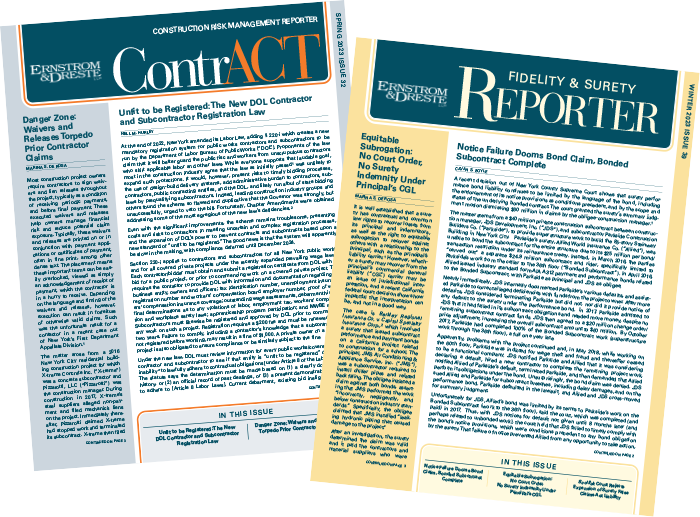Article by: Michael F. Higgins
New York’s Appellate Division, First Department reminds sureties that a performance bond, like any other contract, will be enforced per its terms, while drawing a distinction between the obligations owed by the surety’s bonded principal and the independent obligations owed by the surety to the obligee.1 The court held that consequential damages against the surety for breach of the bond terms “were not foreclosed as a matter of law based solely on a waiver of consequential damages in the [underlying] construction contract.” The appellate ruling reversed the lower court and granted judgment on liability against the surety.
In 2020, the obligee sought to build 21 units of affordable and supportive housing for homeless individuals with mental illness in New York City. It contracted with a construction company to do so via an industry standard AIA contract that required surety bonds. A $ 7.5 million AIA A312™ 2010 Performance Bond was issued by the surety. After problems arose with the contractor’s performance of the work, the obligee sent the required Section 3.1 bond notices to the surety and subsequently terminated the contract, calling on the surety to perform.
Upon investigation, the surety denied the claim based on alleged prejudice caused by the obligee’s failure to notify the surety of the principal’s ongoing default-worthy performance months earlier, and alleged failure to comply with conditions precedent apparently for that earlier “default.”2 The obligee sued the surety solely for breach of contract, based upon alleged breach of its performance bond obligations in delaying action and denying the claim. The obligee was ultimately able to secure a replacement contractor with additional funding from government-related resources.
The obligee sought summary judgment on liability, dismissal of the surety’s affirmative defenses, and an assessment of damages. The surety in defense argued it was discharged by the obligee’s delayed notification of default, and that the obligee had no direct damages, as it had been “made whole” by the outside funding for completion.3 The lower court denied the motion in a three-sentence decision, citing the waiver of consequential damages in the underlying bonded construction contract and the obligee’s lack of evidence that its damages were “not consequential in nature.”4
The appellate court unanimously reversed, siding with the obligee to find the action involved the breach of an independent bond obligation, separate from the performance of the principal’s obligations under the construction contract. Here, the surety acted per Section 5.4.2 of the bond by denying liability and notifying the obligee of the reasons for denial. The court relied on Section 6 of the bond that entitles the obligee to “enforce any remedy available” when the surety denies the claim under Section 5.4. The court stated:
Since the language of the performance bond provides an independent cause of action [against the surety], the waiver of consequential damage in the construction contract does not affect [obligee’s claim].5
The court thus simply applied the plain terms of the bond and granted judgment to the obligee on liability only, with damages to be determined by the trial court.6
Denial of a performance bond claim can present additional risks to the surety, and this court’s contractual interpretation of the commonly used AIA A312™ Performance Bond certainly highlights this danger. Surety professionals and counsel must be aware that damages limitations or similar terms within the construction contract (such as a waiver of consequential damages) may be lost under the terms of Sections 6 and 7 of the A312 should the surety not complete its principal’s obligations per bond Sections 5.1, 5.2 or 5.3. Per this court, a surety’s breach of its bond obligations can give rise to damages flowing from that breach, including increased financing costs, carrying costs for delayed completion, and lost profits, despite any limitation in the bonded contract.
- OH 126th St. Housing Dev. Fund Corp. v Berkley Ins. Co., 2024 WL 4628153 [1st Dept 2024].
- The bond did not require additional notice to the surety of the principal’s default within a specified time frame. The bond also expressly provided that any failure of notice shall not constitute failure of a condition precedent, nor release the surety except to the extent of actual prejudice.
- The surety may well have been granted summary judgment dismissing the action by the motion court except for an issue regarding proper noticing of its cross-motion.
- The application of the waiver provisions to the bond obligations was not addressed in motion papers but was raised by surety’s counsel at oral argument.
- This contrasts with Section 7, which limits the surety’s obligations to be not greater than the contractor under the construction contract had the surety chosen to complete under Sections 5.1, 5.2 or 5.3. That limitation is absent where the surety denies liability under Section 5.4.2.
- The trial court has yet to rule on obligee’s motion for dismissal of the surety’s affirmative defenses.




